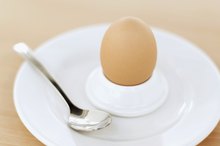What does fact checked mean?
At Healthfully, we strive to deliver objective content that is accurate and up-to-date. Our team periodically reviews articles in order to ensure content quality. The sources cited below consist of evidence from peer-reviewed journals, prominent medical organizations, academic associations, and government data.
The information contained on this site is for informational purposes only, and should not be used as a substitute for the advice of a professional health care provider. Please check with the appropriate physician regarding health questions and concerns. Although we strive to deliver accurate and up-to-date information, no guarantee to that effect is made.
Healthy Breakfasts for Obese People
Eat breakfast like a king, lunch like a prince and do dinner like a pauper -- this old saying is at least partially backed by science. A study published in 2013 in "Obesity" found that eating a large breakfast and a smaller dinner helped overweight and obese women manage their weight 1.** However, just because a breakfast is high in calories for satiety doesn't mean it shouldn't be full of nutritious foods.
A Look at the Numbers
The suggested number of calories to eat for your morning meal fluctuates based on who's recommending it. However, the "Obesity" study had participants eating a 700 calorie breakfast, coupled with a 500 calorie lunch and a 200 calorie dinner. An example of a 700 calorie breakfast might include three scrambled eggs, 1 cup strawberry halves, a slice of whole-wheat toast with 2 tablespoons of peanut butter and a cup of skim milk.
An Egg-Cellent Breakfast
Can Eating 30 Grams of Protein Each Morning Help You Lose Weight?
Learn More
Choose eggs over bagels when selecting your healthy breakfast. **A study published in 2008 in the "International Journal of Obesity" concluded that egg breakfasts aided in weight loss when combined with a reduced-calorie diet 2.* Researchers attributed this to the satiating effect of eggs compared to bagels, white bread and ready-to-eat breakfast cereal. *However, be careful about how you cook your eggs -- frying them in butter or oil won't start your day off right. Scrambled, poached or hard-boiled are healthier options.
- Choose eggs over bagels when selecting your healthy breakfast.
- However, be careful about how you cook your eggs -- frying them in butter or oil won't start your day off right.
Balancing Act
Aim to get a balance of carbs, protein and fat in your morning meal, no matter how many calories you eat. The protein is the foundation of the meal and helps control cravings later on, according to Bastyr University, while the carbohydrates provide energy 4. Stick to complex carbs found in whole grains. The fat in your breakfast -- in the form of avocado, nuts, seeds or olives -- keeps you full longer so you don't overeat at lunch. A balanced breakfast could consist of an omelet made with vegetables for carbohydrates and avocados or olive for healthy fats 4.**
On-the-Go
What Are the Benefits of a High-Protein Breakfast?
Learn More
The morning rush makes a fast-food breakfast or high-sugar breakfast bar seem all the more appealing. If possible, prep healthy breakfasts in advance by putting together breakfast burritos on whole-wheat tortillas with eggs, veggies and low-fat cheese. Store them in the refrigerator or freeze them for long-term storage. If you truly need to stop at a fast-food restaurant for breakfast, "Health" magazine recommends the Protein Artisan Snack Plate at Starbucks, the Fruit and Maple Oatmeal at McDonald's or the Western Egg White & Cheese Muffin Melt at Subway. Bring your own fruit and side of nuts, olives or avocado to boost the calorie content to keep yourself full and the nutrient content high, so you're not tempted by less-healthy sides such as hash browns.
- The morning rush makes a fast-food breakfast or high-sugar breakfast bar seem all the more appealing.
- Bring your own fruit and side of nuts, olives or avocado to boost the calorie content to keep yourself full and the nutrient content high, so you're not tempted by less-healthy sides such as hash browns.
Related Articles
References
- Obesity: High Caloric intake at breakfast vs. dinner differentially influences weight loss of overweight and obese women
- International Journal of Obesity: Egg breakfast enhances weight loss
- Health: America's Healthiest Fast-Food Breakfasts
- Bastyr University: What is a Balanced Breakfast?
- Hoertel HA, Will MJ, Leidy HJ. A randomized crossover, pilot study examining the effects of a normal protein vs. high protein breakfast on food cravings and reward signals in overweight/obese "breakfast skipping", late-adolescent girls. Nutr J. 2014;13:80. doi:10.1186/1475-2891-13-80
- Bachman JL, Phelan S, Wing RR, Raynor HA. Eating frequency is higher in weight loss maintainers and normal-weight individuals than in overweight individuals. J Am Diet Assoc. 2011;111(11):1730-4. doi:10.1016/j.jada.2011.08.006
- Ogata H, Kayaba M, Tanaka Y, et al. Effect of skipping breakfast for 6 days on energy metabolism and diurnal rhythm of blood glucose in young healthy Japanese males. Am J Clin Nutr. 2019;110(1):41-52. doi:10.1093/ajcn/nqy346
- Sievert K, Hussain SM, Page MJ, et al. Effect of breakfast on weight and energy intake: systematic review and meta-analysis of randomised controlled trials. BMJ. 2019;364:l42. doi:10.1136/bmj.l42
- Barr SI, Difrancesco L, Fulgoni VL. Breakfast consumption is positively associated with nutrient adequacy in Canadian children and adolescents. Br J Nutr. 2014;112(8):1373-83. doi:10.1017/S0007114514002190
Resources
Writer Bio
Kelsey Casselbury is a freelance writer and editor based in central Maryland. Her clients have included Livestrong, School Nutrition magazine, What's Up? Media, American Academy of Clinical Chemistry, SmartBrief and more. She has a formal education in personal training/nutrition and a bachelor's degree in journalism from The Pennsylvania State University.









